#Florizelle Liser
Text
BBC News: G7 Summit: Africa seeks new role as nations eye its resources
BBC News - G7 Summit: Africa seeks new role as nations eye its resources
minutes
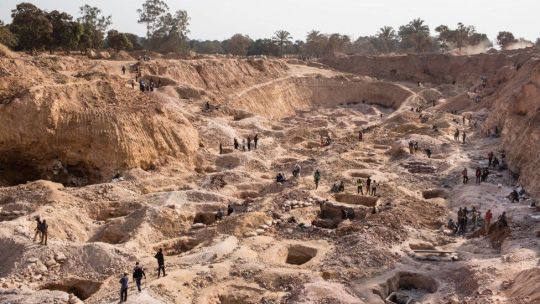
Resources such as Democratic Republic of Congo's cobalt are in huge global demand because of their use in electric vehicle batteries
Africa will not accept that it "should just continue to be a source of raw materials" for the rest of the world, the African Union's Trade Commissioner has told the BBC.
Albert Muchanga says instead his continent wants a future of "genuine and mutually beneficial relationships" with its trade partners.
It comes as the AU's chair has been invited to the G7 summit in Japan amid intensifying competition with China for Africa's natural resources.
With Western powers seeking greater trade links with the continent, there have been visits to a host of African countries in the run-up to the summit from the leaders of France and Germany, as well as the US vice-president.
Japan's Prime Minister Fumio Kishida visited Egypt, Ghana, Kenya and Mozambique at the start of this month as he sought to bolster African support for his efforts to counter Chinese and Russian influence on the continent, as well as in regards to Taiwan and Ukraine.
Speaking in Maputo on 4 May he said: "Many countries of the so-called Global South are hurt and suffering from high food and energy prices. The cause of this issue should be traced to Russia's invasion of Ukraine."
Mr Muchanga welcomes the recognition of Africa's problems. He says the disruption caused by the Covid pandemic is also to blame for problems that are "multi-dimensional".
"It's a recognition of that the North and the South want deeper interdependence, and it's welcome."
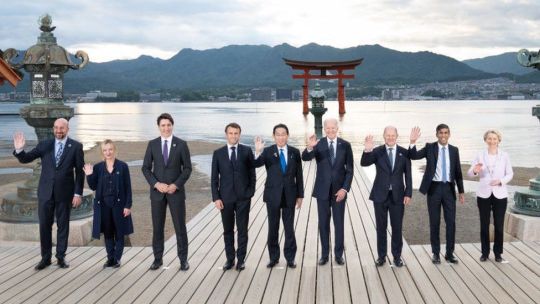
Several G7 leaders have visited Africa in recent weeks as they seek to strengthen cooperation on a range of global challenges
The Zambian official says that with the era of colonialism now in the past, Africa wants to get more benefit from that relationship by equipping itself with the skills to keep more of the economic value from its vast natural resources.
"We are not going to continue as the historical sources of raw materials. It will not work because of a growing population, which wants opportunities for decent jobs, and that can only come from the processes of manufacturing and agro-processing," he says.
"A good example has been given by DRC and Zambia, when they're going to come up with a joint project on the production of batteries for electric vehicles." The two countries are major exporters of the copper and cobalt needed for the batteries, which are in growing demand around the world.
US-China rivalry
The United States is trying to boost its trade ties with Africa as it seeks to tackle climate change. During a visit to Tanzania in March, Vice-President Kamala Harris highlighted a project which will benefit from US financing, which she said was a "first-of-its-kind processing facility on the continent for minerals that go into electric vehicle batteries".
"Importantly, raw minerals will soon be processed in Tanzania, by Tanzanians. It will help address the climate crisis, build resilient global supply chains, and create new industries and jobs."
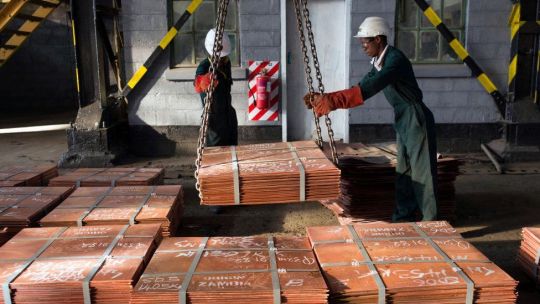
Demand for products such as Zambia's copper has led other countries to focus on increasing trade with Africa
Last year, China's trade relationship with Africa reached a record $282bn (£226bn), according to Chinese customs data. That marked an 11% increase from the year before as prices for commodities such as oil, copper, cobalt and iron ore surged. It also means Africa-China trade is nearly four times as big as US-Africa trade, which came in at $72.6bn.
However "more manufactured and value-added products are shipped to the US than are shipped to China", according to Florizelle Liser, who runs Corporate Council on Africa, a Washington-based organisation that aims to boost US-Africa trade.
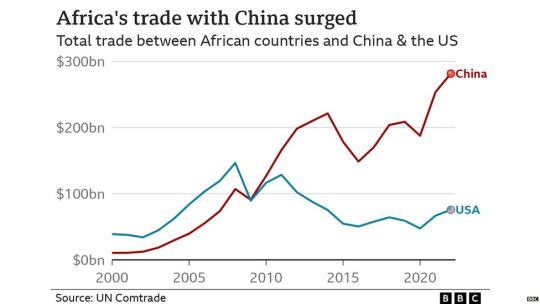
China has become Africa's largest trading partner since it joined the World Trade Organisation in 2001
Ms Liser adds that Africans "whether in government or the private sector really do like working with US companies for a variety of reasons. They liked the American brand."
"They liked the fact that working with the Americans, often there's more transparency in the relationship. And they also like the fact that US companies do a lot in terms of skills transfer, and in technology transfer, and they don't necessarily see this with all the other partners, China as well as others."
China debt concerns
That lack of transparency in trade relations was criticised recently by outgoing World Bank President David Malpass, who told the BBC he was concerned about the long-term implications of Chinese loans to Africa and called for international financial support to be more transparent.
Billions of dollars have been spent on projects such as ports, railways and electricity grids. Despite the economic benefits, it has left countries including Ethiopia, Ghana and Zambia struggling to repay their debts amid claims that China is using them as leverage for political influence to support its demand for natural resources.
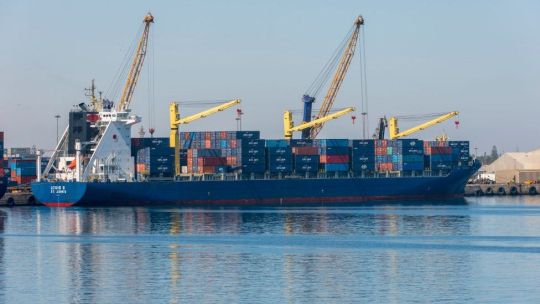
China funded the construction of ports such as Walvis Bay in Namibia which have allowed the export of natural resources
During a visit to Beijing by Gabon's president last month, China's Vice-Foreign Minister Deng Li denied that was the case, saying: "We are not bringing a so-called 'debt trap'. We are bringing development opportunities. We have never attached any political strings to our aid and economic assistance to African countries."
The African Union's Mr Muchanga says: "China has really done quite a considerable job in promoting infrastructure deployment across Africa through the Belt and Road Initiative."
However he says transparency in trade relations is very important. "There should be no hidden clauses. Unfortunately, there have been hidden clauses in the past."
He adds that "at the negotiating table before the deal is signed, everybody should be very clear on what they're signing on. I think that's the lesson that we need to take into the future."
One way Africa is trying to strengthen its hand in trade deals is through the development of the African Continental Free Trade Area. The flagship project of the African Union is aimed at eliminating trade barriers and boosting trade within the continent but has yet to be fully implemented.
"The next stage is to move it to an African Customs Union," explains Mr Muchanga, who hopes that eventually AfCFTA will allow its 54 members to strengthen its negotiating hand with the rest of the world on trade in a similar manner to the European Union.
Mr Muchanga says that the AU's invitation to the G7 summit is "a recognition of the systemic influence of Africa to the global economy".
"Africa should really be able to speak very strongly with one voice on all global economic issues."
#G7 Summit: Africa seeks new role as nations eye its resources#environmental disasters#scavengers#African Resources#stolen legacy#china#vampire debt#economic vultures#African economy#G7
1 note
·
View note
Text
Unlocking Africa's Potential Through Tourism: The Role of Online Travel
Unlocking Africa’s Potential Through Tourism: The Role of Online Travel
The services sector, in particular tourism, is one of the major contributors to Africa’s economy through such functions as providing foreign exchange and employment. It is therefore crucial that governments and the private sector are increasingly working together to grow the sector, that accounts for approximately 7.8% of the African GDP.
“We believe that business opportunities and investment…
View On WordPress
#Cyrus Onyiego#Florizelle Liser#intra-African tourism#Jumia Travel#Mukhisa Kituyi#UNCTAD#World Tourism Conference
0 notes
Text
Nigerian businesses to join 1000+ global business leaders at the US-Africa Business Summit this June
Nigerian businesses to join 1000+ global business leaders at the US-Africa Business Summit this June
Nigerian businesses to join 1000+ global business leaders at the US-Africa Business Summit this June
Corporate Council on Africa’s (CCA) President and CEO, Ms. Florizelle Liser met with key stakeholders in the public and private sector during her recent visit to Kenya and Nigeria. This was part of the ongoing effort to promote the upcoming U.S.-Africa Business Summit from June 18 – 21, 2019 in…
View On WordPress
0 notes
Text
Nigerian businesses to join 1000+ global business leaders at the US-Africa Business Summit this June
Nigerian businesses to join 1000+ global business leaders at the US-Africa Business Summit this June
Nigerian businesses to join 1000+ global business leaders at the US-Africa Business Summit this June
Corporate Council on Africa’s (CCA) President and CEO, Ms. Florizelle Liser met with key stakeholders in the public and private sector during her recent visit to Kenya and Nigeria. This was part of the ongoing effort to promote the upcoming U.S.-Africa Business Summit from June 18 – 21, 2019 in…
View On WordPress
0 notes
Text
Human rights, cardinal objective of Buhari administration – Mohammed
Aidoghie Paulinus, Abuja
Minister of Information and Culture, Alhaji Lai Mohammed, in Washington DC, United States, said the protection of human rights was a cardinal objective of the President Buhari administration.
Mohammed, in a statement by his Special Assistant, Segun Adeyemi, and made available to Saturday Sun in Abuja, also said the violation of peoples’ rights was not a government policy.
Mohammed made the government’s position on human rights known while addressing a high-level round-table organised by the Atlantic Council, an American think-tank on international affairs.
The high-level roundtable was attended by about 30 current and former senior US government officials, as well as other stakeholders in the US policy on Africa.
The participants included former Commander, US Africa Command, Gen. William Ward (rtd), a former US Ambassador to Nigeria, Ms Robin Sanders; President and Chief Executive Officer, Corporate Council on Africa, Ms Florizelle Liser; the Nigerian Ambassador to the US, Amb. Sylvanus Nsofor, amongst others.
Mohammed said the picture of impunity and complete disregard for extant laws and international obligations painted by the Amnesty International (AI) in a recent report is not a true reflection of the character and ethics of the Government of Nigeria or any of its agencies.
He said the Buhari administration has taken several measures to address human rights violation in the course of the counter-insurgency operations, including the establishment of Human Rights Desks in all military formations, the quarterly Human Rights/Military Dialogue, Training on Mainstreaming Human Rights into Counter-Insurgency operations, and Court Martials of officers indicted for human rights violations.
READ ALSO: Killings: Ignore Northern leaders shedding ‘Crocodile tears’ Presidency tells Nigerians
”Very soon, the Federal Government will adopt a National Policy on the Protection of Civilians in conflict situations to further strengthen and entrench its constitutional practice of Protection of Civilians,” Mohammed said.
Mohammed further opened up on the counter-insurgency operations in the country, maintaining that Boko Haram has been badly degraded.
He added that following the development, the terrorist group is currently incapable of carrying out organised massive attacks beyond using women and children to carry out suicide bombings against soft targets.
”Many have queried how we could say Nigeria is winning the battle against Boko Haram when the insurgents have continued to carry out deadly attacks. However, to understand this, it is necessary to put things in context.
When President Buhari was being sworn into office May 29, 2015, 24 local governments making up a territory, three times the size of Lebanon, were firmly in the hands of Boko Haram.
“They hoisted their flag, collected taxes, installed their own Emirs and administered a large swath of territory. That is history now as not an inch of Nigeria’s territory is being administered or controlled by Boko Haram.
”Before the advent of this administration, Boko Haram could carry out attacks anywhere in the North East and beyond at a time of their own choosing.
“They attacked the United Nations (UN) Complex, the police headquarters, motor parks and a military barrack in the capital city of Abuja. That is now history,” Mohammed stated.
Mohammed also said the incessant farmers-herders clashes were neither religious nor ethnic in nature, as they have been portrayed in some circles.
”There is no question that this (conflict) is driven mostly by an increased contest for dwindling natural resources like land and water.
“This has been worsened by demographic pressure and climate change. Nigeria’s population in 1960 was 45 million, and this has ballooned to about 200 million in 2018, but the available resources have not grown at all. If anything, they have shrunk.
”As desertification continues to encroach and the Lake Chad that provided a livelihood for over 35 million in several countries shrank from 25,000 to 2,500 square kilometers, herders in particular are forced to move south in search of grazing land and water for their cattle,” Mohammed added.
Meanwhile, efforts by Saturday Sun to get the reaction of the Amnesty International Country Director, Osai Ojigho, did not yield result.
Ojigho did not respond to telephone call, nor a text message from Saturday Sun at the time of filing this report.
The post Human rights, cardinal objective of Buhari administration – Mohammed appeared first on – The Sun News.
The post Human rights, cardinal objective of Buhari administration – Mohammed appeared first on kenzymirror.com.
from WordPress https://ift.tt/2LCdqyQ
via IFTTT
via Blogger https://ift.tt/2NyOGbk
0 notes